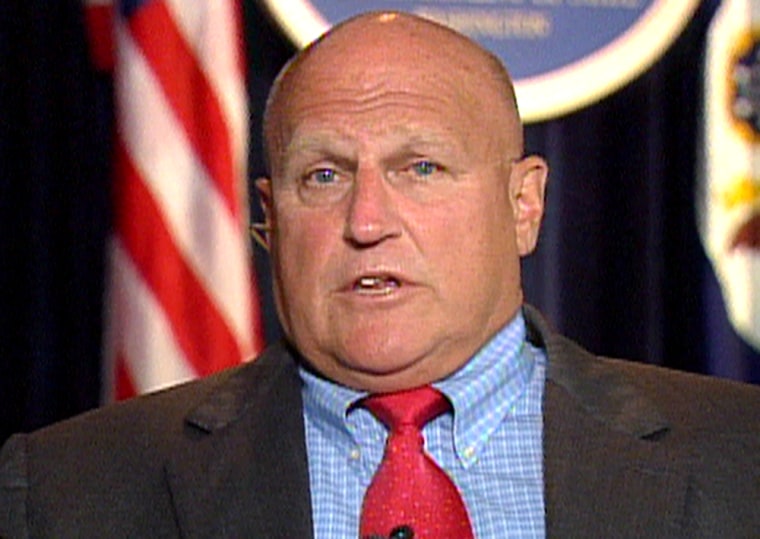Legal custody of Saddam Hussein and 11 others was transferred to the Iraqis on Wednesday. In an interview with MSNBC's Joe Scarborough, Deputy Secretary of State Richard Armitage talked about why this is significant, as well as his optimism on Iraq's sovereignty.
Below is an excerpt. The full interview is scheduled to air on "Scarborough Country" Wednesday, 10 p.m. ET on MSNBC.
Joe Scarborough, host: Saddam Hussein has been transferred to the new Iraqi government. How significant is it historically for this country?
Deputy Secretary of State Richard Armitage: I think it’s significant in two ways: First and almost most significant of all, is that it shows that Iraq is sovereign. That it took possession of Saddam and these eleven other bad boys, I think, is a graphic demonstration of that. Second of all, I think it brings a lot of satisfaction to more than a million families in Iraq to know that they are going to see a process in which those who committed so many terrible crimes are held liable.
Scarborough: The New York Times called the transfer of sovereignty to this new Iraqi government "hollow." What’s your response?
Armitage: Well, cynicism runs ripe in certain quarters in the United States. I would have had a different view— that is there is a certain amount of optimism out there now that there is a very good sovereign government of Iraq. We are going to be developing partners who will actually fight for their country where they might not have fought for occupiers. So I take a slightly different view from the New York Times.
Scarborough: One of our missions right now, one of the new government missions, has to do with stopping foreign fighters from coming into Iraq and destabilizing this new government. Some of those fighters are coming over from Iran. Two new more Iranians were kicked out the United States for spying. How active is Iran in the fight against this new Iraqi government, and the fight against America’s efforts to bring democracy, freedom, pluralism to Saddam Hussein’s former nation?
Armitage: Right now as a general matter, Iran is not doing what they need to do to seal their borders. But primarily, they are interested in developing their influence, their reach into the Shia community in the south. They are not particularly involved, as far as I know, in military activities. But as I say, the porous border is harmful. On the questions of the two guards at the U.N., what’s interesting about that, is that this is the third time that we’ve had a pitch of fellows who are extensively in New York to guard the Iranian mission, but they sure do engage in a lot of other activities.
Scarborough: Mr. Secretary, what is it like for you, as a person that’s served in the United States government for some time, to try to bring this man to justice? What does it mean to you that Saddam Hussein is now under the control of what may soon be a democratically-elected Iraqi government?
Armitage: You can’t imagine the feeling of satisfaction I have, not for myself and not for this government, but for the people of Iraq. Over a million people have died at his [Saddam's] hands. There are so many families in Iraq who will finally be able to have resolution to their suffering. I think tomorrow is going to be a banner day when the twelve bad boys are parading before an Iraqi judge and hearing the charges against them.
